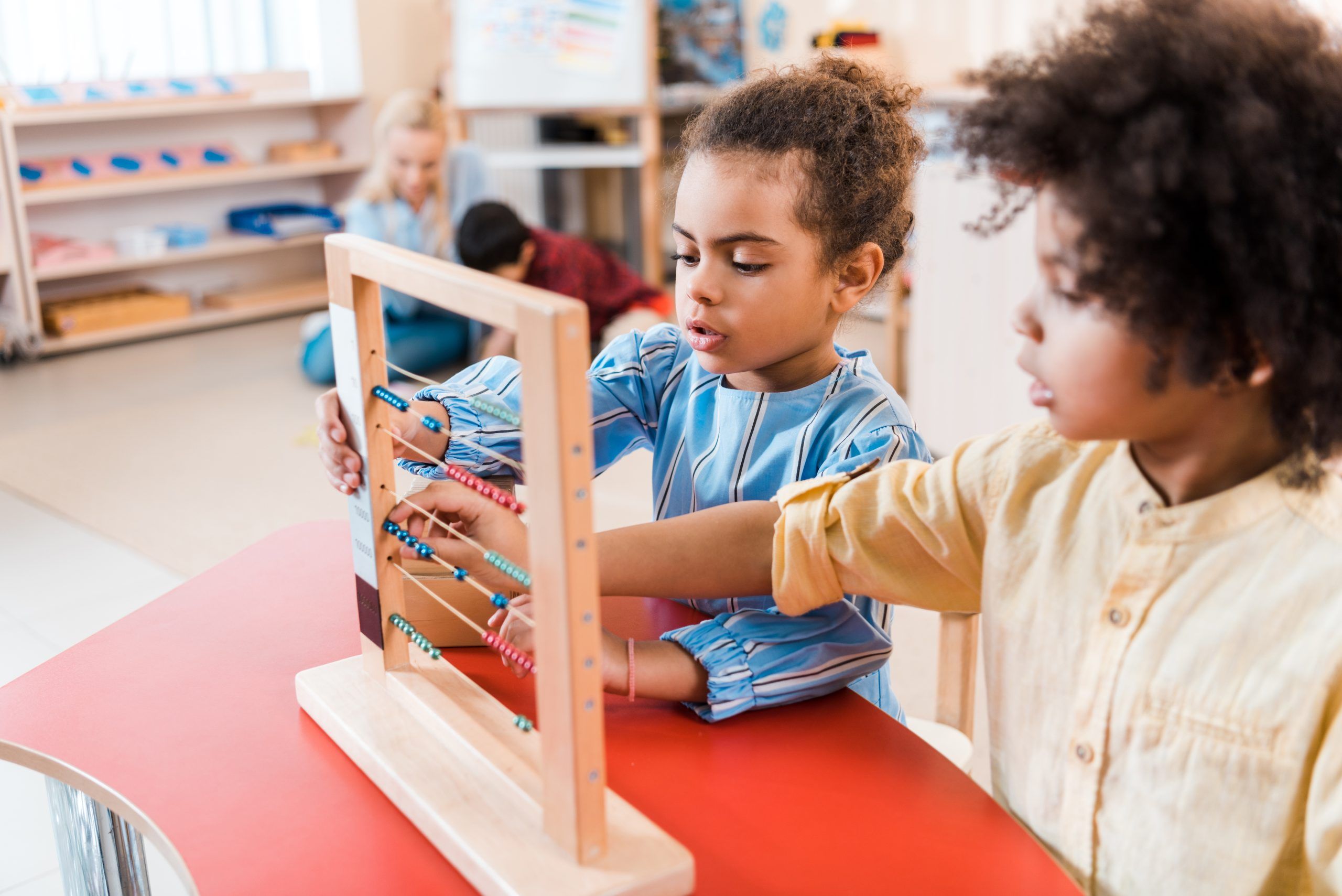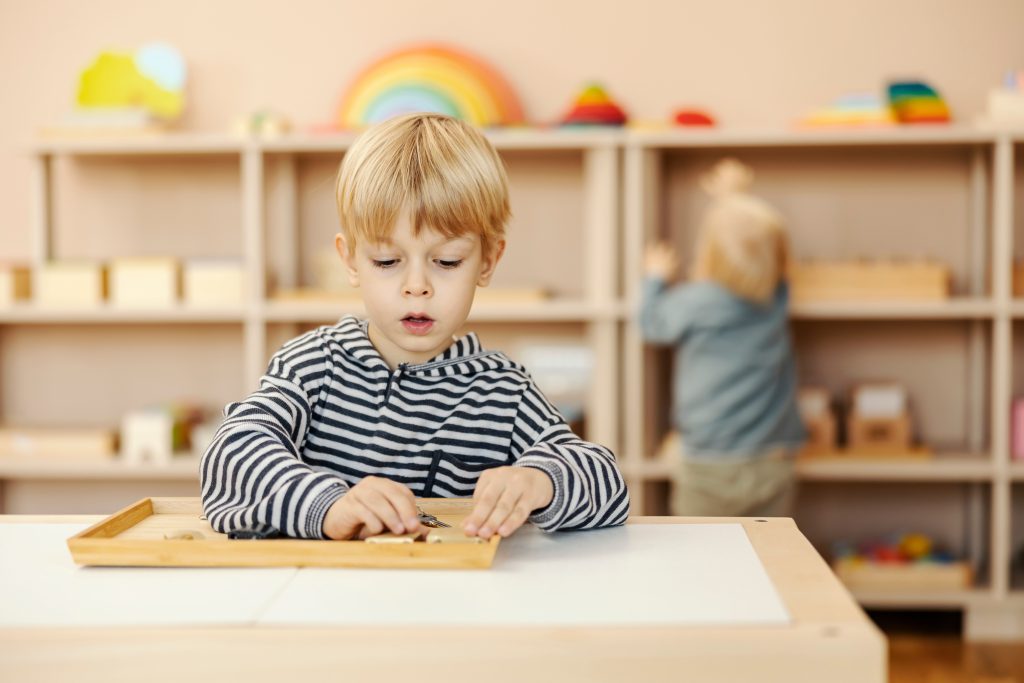The Beauty of The Montessori Early Childhood Three Year Cycle Series – The Third Year

By Catherine Mathews
Montessori education does not strive to prepare students to be ahead for a traditional Kindergarten year, but rather looks at the whole experience for the Early Childhood student. Being in the program for the 3rd year is where all the lessons and material the child has been learning in years 1 and 2 solidifies and becomes permanent.
With two years under their belts Third Year students stroll into the classroom ready to take on the oldest sibling, protector, and leader persona. They feel so confident in their knowledge of the classroom and how to support others inside it. They can help others at Line Time to sit with a ready body, can rub backs at rest time, and care for their environments in much more complex ways. They love the chance to be given responsibility in the classroom and really appreciate the opportunity to join a Third Year meeting where leadership opportunities are discussed. The peer-mentoring role is often highly sought after in our Third Year students. They first demonstrate to the teachers their mastery of a skill, after which they have the opportunity to become the teacher for a younger or more inexperienced student. This builds such great confidence.
They enjoy making goals for themselves on a limited basis. A long list of goals is still too much for students at this age, but a short list of attainable but challenging goals they have devised for themselves can support students at this age to accomplish great things. During this year many classroom teachers opt to have a weekly check-in with Third Year students to see how they are coming along with their personal goals and if there are any new goals they want to set for themselves.
Areas of Emphasis:
Academic Learning, Leadership Opportunities, Grace & Courtesy
Academic Learning:
Third Year students are excited by all the more challenging lessons in Mathematics and Language Arts, as well as being ready to take on an interdisciplinary approach to the Cultural subjects. They have the opportunity to hone their reading through the classroom’s Reading Scheme and their writing skills through the Writer’s Workshop and with Research Writing. They look forward to utilizing budding math skills in the classroom using the incredible Cubing and Squaring Chains, the Golden Bead Math operations, and practicing their memorization of math facts. Work with measurement sends them out into the classroom and school to measure the length of the classroom shelves, the dollar bill, and often the length of animals they are studying about in the Geography area. They are ready to understand how their world displays the use of fractions everywhere as they begin to understand what is and is not a fraction and how their food prep gives them opportunities to work with fractions all the time. Many classrooms also integrate learning about money with miniature stores and price tags. All these give Third Years a chance to work with others, which becomes increasingly important. They are additionally becoming increasingly aware of the intricate way our world is interlaced. That we all affect each other and every living thing around us. They have great compassion for the suffering of their fellow beings and want opportunities to make a difference. They want more and more challenging Practical Life such as sewing and knitting projects, leadership roles in caring and restoring the classroom, more detailed art exploration, deep cleaning of the classroom sinks and every other surface the teachers will let them work on, laundry and ironing, wrapping a package, food preparation extensions, and woodworking projects.

Leadership Opportunities & Grace & Courtesy
Leadership opportunities are around every corner for our Third Years. They have been practicing their Grace and Courtesy for a long time and now are ready to become the expert. In fact, when given the chance they run with the opportunity to show just how much they know. They support their younger peers by demonstrating how to listen to directions, how to move in our environment, how to clean up after themselves, how to make room for others at the cubbies, how to tell what kind of voice is appropriate at different times, how to make room for someone at the line, how to respectfully say ‘no thank you’, how to walk up and down the stairs, how to show respect during daily walking the line and silence activities, how to be quiet when someone is talking, observing audience etiquette, following proper observation distance of another student working, welcoming visitors into the environment, and how to remind someone of their responsibilities in the classroom in a respectful manner. Many Third Year students are prepared not only to show how to properly follow the conflict resolution pattern, but many are prepared to become mediators for their younger peers.
Their Capstone Year takes a front row as they are eager to practice all year for culminating activities such as demonstrations of learning after continent studies and many Thirds Years participate in preparing for and serving their parents a special Graduation Meal of Thanks. They often discuss and decide on the menu as a group, prepare the food, practice their serving skills, prepare the table for their families, as well as participate in the creation of the evening’s program. As they end their year they can literally run, with a lot of coaching, a lot of the End of Year Programs for their class. They are ready to move on; to bridge into their next level of learning and are fast becoming an integral member of their social community.